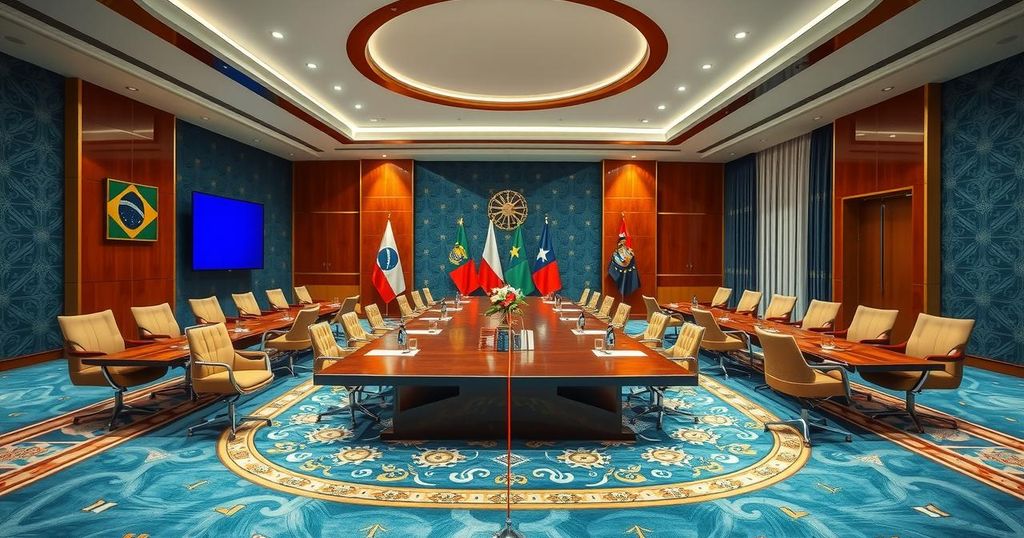Brazil and Chile Strengthen Trade Relations at Business Forum

President Lula and President Boric attended the Brazil-Chile Business Forum, focused on enhancing bilateral trade relations. They emphasized mutual benefits in trade, social policies, and signed 13 agreements across various sectors. The event highlighted significant trade statistics and outlined plans for infrastructure development to benefit both nations.
On April 22, President Luiz Inácio Lula da Silva participated in the Brazil-Chile Business Forum in Brasília, which brought together business leaders from both nations. Co-hosted by Chile’s President Gabriel Boric, the event focused on enhancing trade relations. It took place at the National Confederation of Industry (CNI) headquarters, aiming to build a platform for cooperation across various sectors.
“A good deal is one where both countries profit,” Lula stated, emphasizing the importance of mutual benefit in business dealings. He made clear that while presidents do not directly engage in commerce, their role is to create opportunities for entrepreneurs to thrive. He highlighted the value of fostering strong relationships within trade agreements.
During his address, Lula voiced a commitment to prioritizing the sovereignty and interests of both Brazilian and Chilean populations. He expressed a strong desire to improve access to technology, education, and other essential services, aiming for a future where both peoples prosper.
Furthermore, Lula touched on how effective social policies can drive economic growth and enhance quality of life. He noted that in the last two years, the poorest in Brazil saw a significant income increase of 10.7%, reflecting positively on tourism and encouraging more Brazilian travelers to explore Chile.
Chilean President Boric reinforced the security of investments in both nations, asserting that Brazil is Chile’s third-largest trading partner, following China and the US. Moreover, he highlighted the Capricorn Bioceanic Route project, which connects Brazilian ports to Chile, as a prime example of regional integration and cooperation.
Mario Cezar de Aguiar from the National Confederation of Industry expressed gratitude for the leaders’ presence and emphasized the need for collaboration between businesses and governments to respond to global challenges with resilience. Similarly, Rosario Navarro, President of the Chilean Society of Industrial Promotion, underscored the Forum’s role in setting a clear path for integration between Chile and Brazil.
On the same day, a bilateral meeting resulted in the signing of 13 agreements spanning multiple sectors, including justice, science, and technology, reflecting a commitment to deepen ties. Brazil and Chile have been enhancing their political, economic, and trade interactions, which have shown consistent growth in mutual investments across several sectors.
So far, in early 2025 alone, trade reached USD 2.7 billion, with Brazil exporting goods worth USD 1.56 billion and importing USD 1.21 billion, resulting in a notable trade surplus. Key exports from Brazil include crude oil, meat, and automobiles, while Chile provides significant imports such as wine and salmon. As both nations continue to strengthen their partnership, the commitment to regional economic integration remains strong.
This ongoing collaboration is not only vital for economic growth but also highlights a shared vision for progress in science and technology, defense, and economic initiatives. As both countries navigate their futures, the outcomes from the Forum indicate a promising path forward, uniting them towards common goals for sustainable development and mutual prosperity.
The Brazil-Chile Business Forum marked a significant step towards bolstering trade relations between the two nations. With a focus on mutual benefits and economic growth through collaborative agreements, both leaders expressed commitment to support their peoples’ interests. The signing of multiple agreements and the discussion of ongoing infrastructure projects illustrate a solid foundation for future cooperation. Trade statistics reveal a thriving bilateral exchange, suggesting ample room for growth in the years to come.
Original Source: www.gov.br







